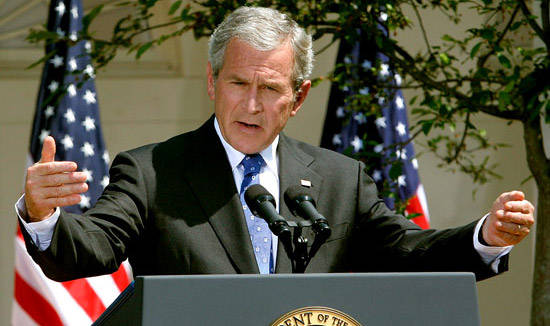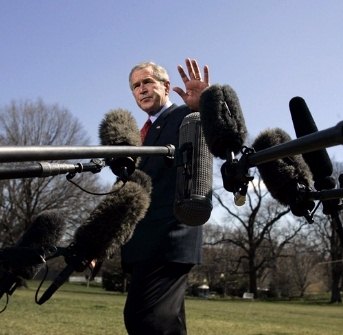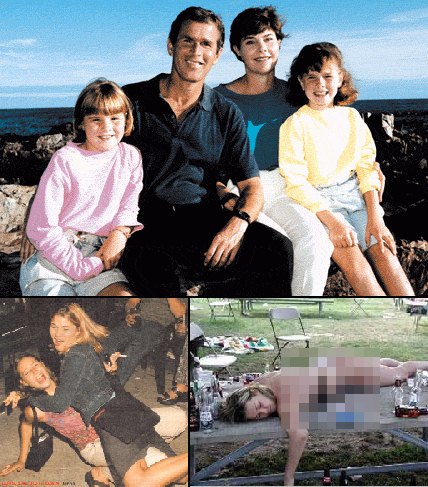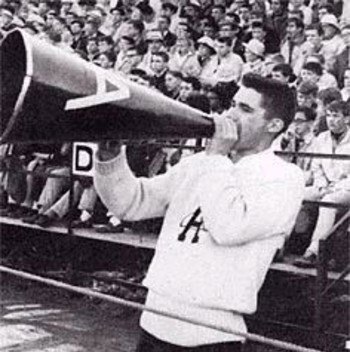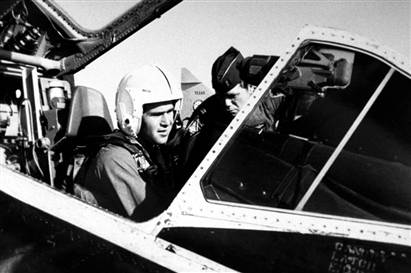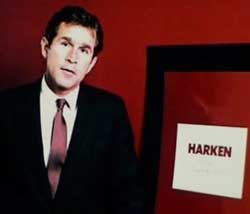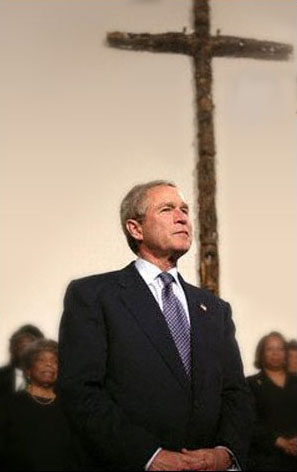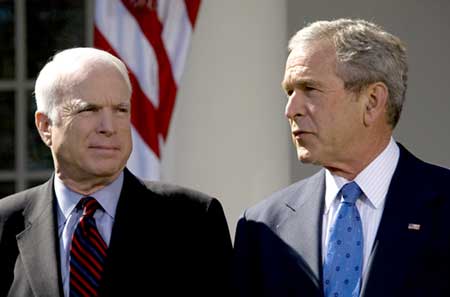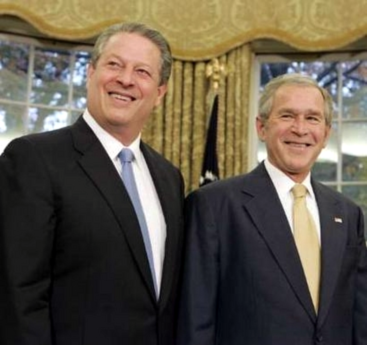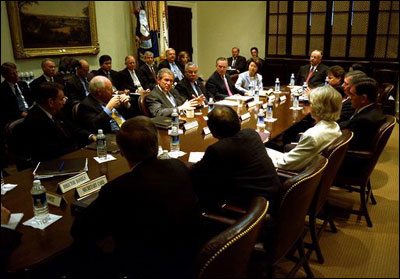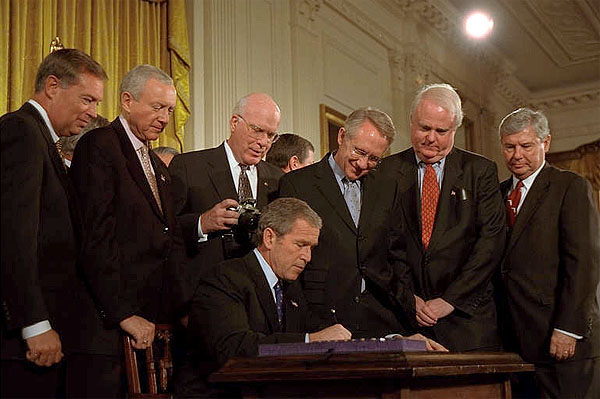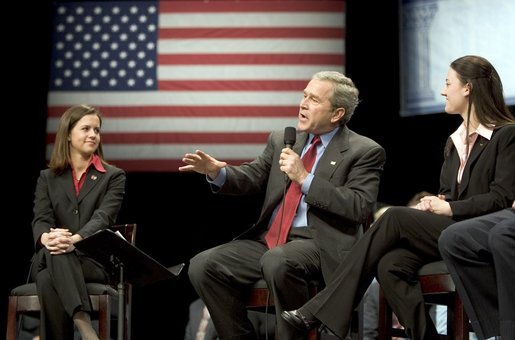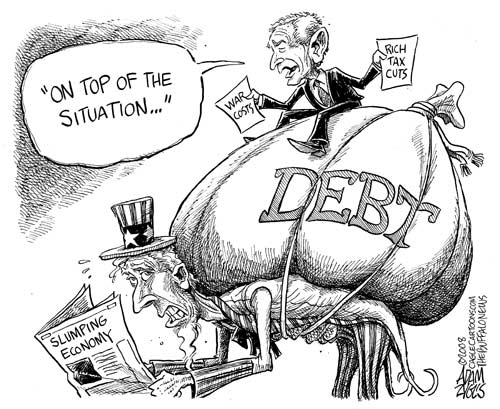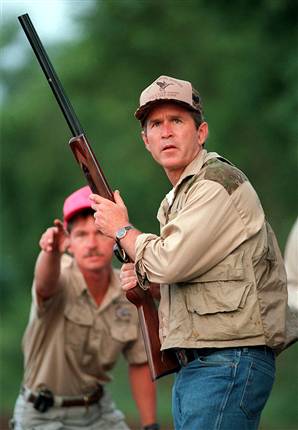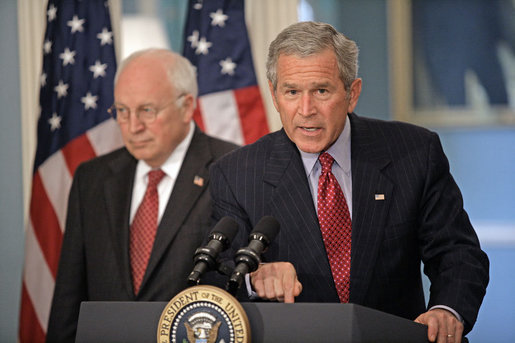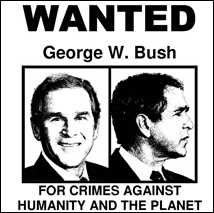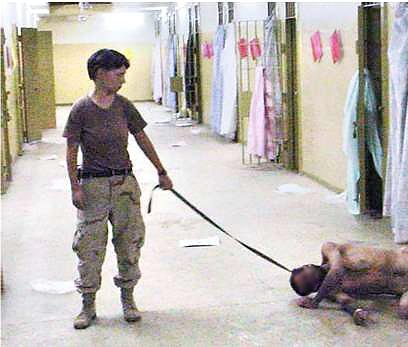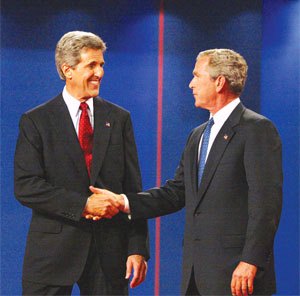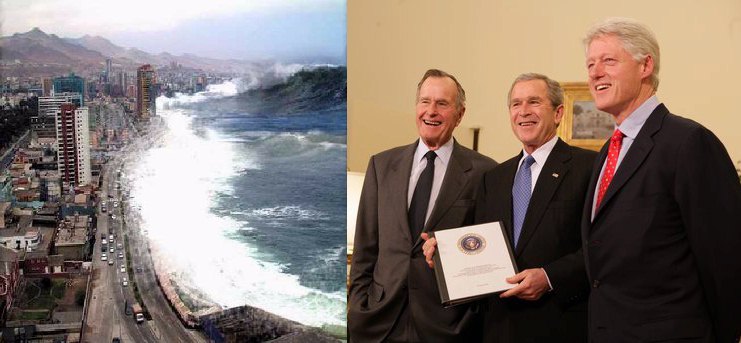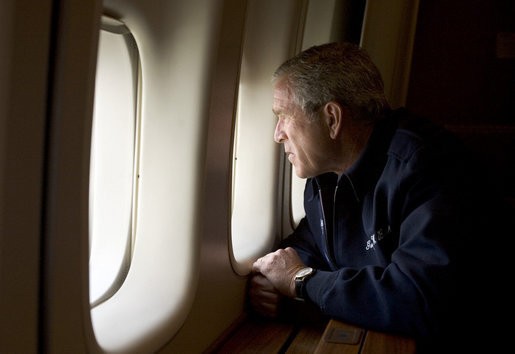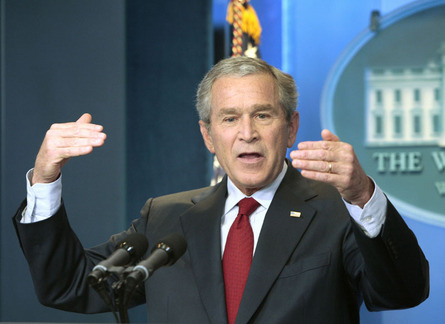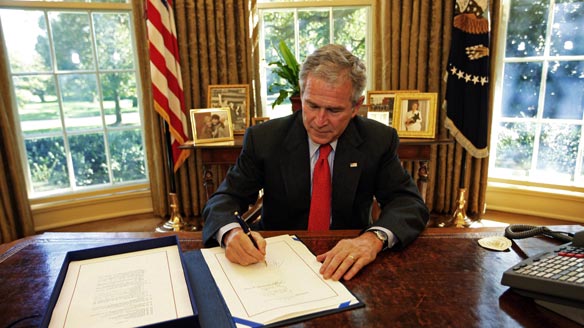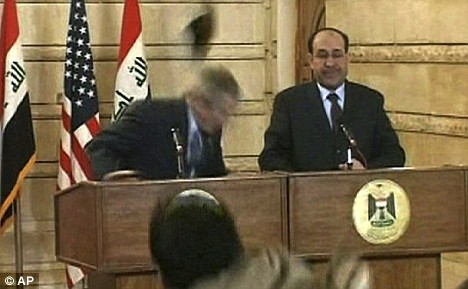|
|
|||||||||||||||||||||||||||||||
|
George W. Bush and the Bush Administration 2001 - 2008
George Walker Bush
Born into a life of riches George W. Bush went on to follow in his father's footsteps to become the forty-third President of the United States and one of the most controversial figures in American history. To understand why he is so controversial you have to look at the story of his life, his beliefs and his actions as President. Part of the reason Bush is so controversial is because there is a lot of debate about his intelligence, whether he is just a puppet of vice-president Dick Cheney, or whether he just pretends to be an idiot. Part of the Bush phenomenon is the public gaffes he makes when talking to the public which suggest that he either lacks intelligence, or is secretly a maniacal genius. We have included a variety of George W. Bush quotes in this article.
"If this were a dictatorship, it'd be a heck of a lot easier, just so long as I'm the dictator."
TABLE OF CONTENTS Family & Personal Life
Family & Personal Life
George Walker Bush was born in New Haven, Connecticut on July 6, 1946 into a family of privilege. Bush is the eldest son of former U.S. President and oil tycoon George H. W. Bush and Barbara Bush. He was raised in Midland and Houston, Texas, with his four siblings (Jeb, Neil, Marvin, and Dorothy). A second sister, Robin, died from leukemia at the age of three in 1953. In 1977 he was introduced to Laura Welch at a friend's BBQ and proposed to her after three months of dating. They married on November 5th 1977 and settled in Midland, Texas. In 1981, Laura Bush gave birth to twin daughters, Jenna and Barbara Bush, who made headlines in recent years for getting drunk on many occasions, running around naked in the hallways of an Argentina Hotel and passing out in a public park. Bush says his wife has had a stabilizing effect on his private life, claiming it was her influence his 1986 that caused his decision to stop drinking. Bush had multiple accounts of alcohol abuse.[27] In one instance, Bush was arrested near Kennebunkport, Maine for a DUI on September 4, 1976. He was fined $150 and had his Maine driver's license suspended until 1978. Laura Bush has yet to convince her not-so-elegant daughters to also quit drinking.
"I saw an elegant beautiful woman who turned out not only to be elegant and beautiful, but very smart and willing to put up with my rough edges, and I must confess has smoothed them off over time." - George W. Bush.
EducationGeorge W. Bush studied at the Kinkaid School in Houston, Texas, prestigious private school for rich children. He later went to Phillips Academy, an all-boys private high school in Andover, Massachusetts and and during his senior year was the head cheerleader. Like his father, Bush attended Yale University from 1964 to 1968, receiving a Bachelor's degree in history in 1968 and maintained a B average despite experimenting with cocaine and marijuana. While there Bush was a member of the secretive and conspiracy-theory prone "Skull and Bones" Society, which John F. Kerry (Bush's rival in the 2004 election) is also a member of.
“I wouldn’t answer the marijuana questions. You know why? Because I don’t want some little kid doing what I tried." - George W. Bush.
Dodging the Vietnam WarAfter graduating from Yale George W. Bush enlisted in the Texas Air National Guard in May 1968 during the height of the Vietnam War draft. He failed the aptitude test, but got in anyway thanks to his father's political influence. During his time with the Texas Air National Guard Bush went AWOL and never finished his military contract of "48 scheduled inactive-duty training periods" over a 6 year period. He was frequently absent from drills, requested for a transfer, and at one point he failed to take a physical and a drug test and was suspended August 1st 1972. On October 1st 1973 Bush was given early discharge from the Texas Air National Guard and transferred to the inactive reserves in Denver, Colorado. By this time the Vietnam War was almost over and troops were being sent back home.
"I was not prepared to shoot my eardrum out with a shotgun in order to get a deferment. Nor was I willing to go to Canada. So I chose to better myself by learning how to fly airplanes." - George W. Bush.
Business CareerIn 1978 George W. Bush ran for the House of Representatives and lost by 6000 votes. Disappointed he went into the oil business and borrowing cash from his father and his father's Saudi Arabian (including Salem bin Laden, a half-brother of Osama bin Laden, who died in a 1988 plane crash in San Antonio, Texas) contacts he created Arbusto Energy (he later changed the name to Bush Exploration). In 1984 Bush Exploration was bought out by Spectrum 7, which in turn was bought out by Harken Energy in 1986. While at Harken Bush was accused of insider trading when he suddenly sold his stock off just before the company announced huge losses, but the charges by the Securities and Exchange Commission were later dropped. The board of the SEC had been appointed by Bush's father, George H. W. Bush who was vice president during the Reagan years. Fleeing financial scandal in Texas Bush went to Washington in 1988 to help in his father's presidential election campaign. He later returned to Texas to purchase a share of the Texas Rangers baseball franchise in April 1989 for $600,000. He eventually sold his share for $14.9 million in 1998.
"Too many good docs are getting out of the business. Too many OB-GYNs aren't able to practice their love with women all across this country." - George W. Bush.
Governor of TexasIn 1994 George W. Bush ran for governor of Texas, making some unsual promises like promising to allow Texans to obtain permits to carry concealed weapons. Once in power he used the previous budget surplus to give Texans a tax cut of two billion dollars, executed 152 criminals out of 153 inmates on death row, and he proclaimed June 10th 2000 to be Jesus Day in Texas (which violated the First Amendment, "Congress shall make no law respecting an establishment of religion"). He won re-election in 1998 and cut environmental spending and increased funding to Christian organizations. Under a 1999 Texas state law, electric retailers must buy a percentage of energy from renewable sources.
"There's an old saying in Tennessee — I know it's in Texas, probably in Tennessee — that says, fool me once, shame on — shame on you. Fool me — you can't get fooled again." - George W. Bush.
"You know I could run for governor, but I'm basically a media creation. I've never done anything. I've worked for my dad. I worked in the oil business. But that's not the kind of profile you have to have to get elected to public office." - George W. Bush, 1989. The Republican Primaries
In 1999 George W. Bush announced his intentions to seek the Republican nomination for the presidency of the United States. He ended up competing with more experienced veterans and the likes of John McCain, Elizabeth Dole, Steve Forbes and John Kasich. Bush rode on a platform of a compassionate conservative, tax cut, more military/education funding and by the end of the race it was just him and a slightly more to the left John McCain. McCain initially was the more popular candidate, but Bush managed to gain momentum and swing more voters by portraying John McCain as too friendly with liberals. McCain frequently preached bipartisanship and trying to work with the Democrats instead of against them.
"The fact that he relies on facts—says things that are not factual—are going to undermine his campaign." - George W. Bush, March 4th 2000.
"If you're sick and tired of the politics of cynicism and polls and principles, come and join this campaign." - George W. Bush, February 16th 2000.
Election 2000George W. Bush surprised some people by picking his father's old chief of staff Dick Cheney as his running mate, making his proposed government seem more and more like a carbon copy of his father's inner circle. During the campaign he criticized his Democratic opponent Al Gore on issues of the environment, gun control and taxes. The election polls were very close and it was a tight race. During the November 7th election voting irregularities in Florida, a key battleground state where Bush's brother Jeb was governor, caused a scandal over who actually won. The voting irregularities were due to a faulty machine ballot count and approx. 90,000 African-Americans who weren't allowed to vote because they had the same names of criminals living in other states. Their names were compiled by a company called DBT Choice, which was contracted by Jeb Bush, his secretary of state Katherine Harris and Clayton Roberts from the Florida department of elections and paid $2.3 million to track and remove criminals from the voter list. By law they DBT was supposed to verify the list is accurate, but never did. Bush ended up winning Florida by a mere 537 votes and won the election, despite losing the popular vote by 543,895. The scandal over the voting irregularities ended up in the Florida Supreme Court and eventually the US Supreme Court who eventually ruled in Bush's favour. African-American voters later protested that they had been robbed of their voting rights, but their complaints were turned down in the House of Representatives by none other than outgoing vice-president and president of the senate Al Gore who said "While I strongly disagree with the court's decision, I accept it."
"I don't make any apologies for what I do on the campaign trail." - George W. Bush, February 24th 2000.
"You know something. We are going to win Florida. Mark my words. You can write it down." - George W. Bush.
"Listen, I'm just as shocked as you are that I'm sitting here talking about the presidency - it's never been a part of my - my life's ambition hasn't always been to be the president." - George W. Bush, April 27th 2000.
The Bush AdministrationGeorge W. Bush's first 8.5 months as president were unusual. He was the first and only president to arrive at the White House amidst protesting crowds. He also spent 42% of his time on vacation and nearly choked to death on a pretzel. George W. Bush's key staff members: Vice President Dick Cheney (2001–2009); Secretary of State Colin Powell (2001–2005) Secretary of Defense Donald Rumsfeld (2001–2006) Attorney General John Ashcroft (2001–2005), Secretary of Homeland Security Tom Ridge (2003–2005) and Michael Chertoff (2005–2009).
"We don't take a bunch of polls and focus groups to tell us what -- to how to, to how to -- to what we ought to do in the world."
Domestic PolicyGeorge W. Bush's first acts as president was to create the No Child Left Behind Act which cut funding to physical education and shifted it to literacy programs, cut Social Security funding, cut pension plans of seniors, cut Medicare benefits, banned embryonic stem cell research, created the Partial-Birth Abortion Ban Act, and made new legislation that would allow the government to view abortion records of American citizens, considered an invasion of privacy rights by women's rights groups. During his two terms in office Bush did not endorse a single piece of gay rights legislation, but neither did he oppose any. He even met with the group Log Cabin Republicans, a right-wing gay rights group. Officially Bush is opposed to gay marriages due to Republican policy, but he's made no efforts to hinder gay rights. Bush is the first Republican president to appoint an openly gay man to serve in his administration, Scott Evertz as director of the Office of National AIDS Policy. His nominee as ambassador to Romania, Michael E. Guest, also became the first openly gay man to be confirmed by the Senate as a U.S. ambassador. In his first term, Bush appointed Colin Powell as Secretary of State. Powell was the first African-American man to serve in that position, and was succeeded by Condoleezza Rice: Rice became the first African-American woman to hold the post. In 2005, he appointed Alberto Gonzalez as the United States Attorney General, the first Hispanic to hold that position. In total, Bush has appointed more women and minorities to high-level positions within his administration than any other U.S. President. With regards to NASA Bush proposed a permanent base on the moon and eventually sending manned missions to Mars to search for valuable resources (see Is there Oil on Mars?), but his proposals met with funding resistance in the Senate/House of Representatives and thus NASA ended up being ignored during the remainder of his administration. The Space Shuttle fleet is scheduled to be retired in 2010 and the USA will be reliant on Russian help for transporting astronauts to the International Space Station.
"We may discover resources on the moon or Mars that will boggle the imagination, that will test our limits to dream."
Bush also promoted the partial privatization of Social Security (by giving a portion of it to the banks in the form of retirement savings accounts), an idea most Democrats and some Republicans are critical of because it would leave people's retirement exposed to market fluctuations and a stock market collapse. After September 11th he also created the USA Patriot Act, a variety of public surveillance programs designed to spy on the American public, bolstered anti-terrorism funding and border security. The Patriot Acts includes: 1. "Project Lookout" which distributes "watch lists" of people alleged to be suspicious, included No Fly lists. 2. "Operation TIPS" which encouraged people to report suspicious activity. 3. "The Worldwide Attack Matrix" which uses covert operations abroad to defuse terrorist threats to U.S. interests. 4. "Policy Analysis Market", a program which would allow and monitor online trading/betting of terrorist futures, in the bizarre hope that futures could somehow predict terrorist attacks. PAM was later scrapped due to public outcry. "The idea of a federal betting parlor on atrocities and terrorism is ridiculous and it's grotesque," said Ron Wyden, Oregon State Senator. 5. The Foreign Intelligence Surveillance Court of Review which will review government acts of domestic spying. Bush also vetoed every port security initiative between 2002 and 2004, including the 2002 Container Security Initiative which would have started inspecting the seven million cargo containers that arrive in the United States every year for drugs, explosives and nuclear materials by scanning the containers using gamma and X-ray technology.
"Every nation in every region now has a decision to make. Either you are with us, or you are with the terrorists."
Economic PolicyGeorge W. Bush wanted a $1.6 trillion tax cut, but due to lack of Senate support only pushed through a $1.35 trillion tax cut program aimed at the rich and upper class. Bush is a supporter of the "trickle down" theory of tax cuts stimulating the economy, but this theory is flawed because wealthy people tend to either not spend their money or invest it overseas. Thus Bush's tax cuts did more to pad bank accounts and investments in Asia and Europe. The US Treasury Secretary, 450 economists, including ten Nobel prize laureates opposed the tax cut, saying a tax cut aimed at the poor and middle class would be more effective because they are guaranteed to spend the money rather than stick it in a bank or send it overseas. Bush's tax cuts contributed to record budget deficits during the Bush administration, raising the US National Debt to $10.9 trillion by the time he will leave office on January 20th 2009.
Additions to National Debt
The Republican Party favours laissez-faire approach to market economics, which essentially amounts to a lazy "do nothing" philosophy in the hopes the market will somehow monitor itself. Under George W. Bush the American economy stagnated with an average real GDP growth of 2.3% (GDP growth in the USA is usually 4 to 5%). Joblessness by the end of Bush's reign had spiked to a 16 year high with an average unemployment rate of 5.2%. The poverty rate rose from 11.7% in 2001 to 14.3% in 2008. Child poverty in the USA is 21.9% (2006). In 2005 Bush emphasized the need for comprehensive energy reform and proposed increased funding for research and development of renewable sources of energy such as hydrogen power, nuclear power, ethanol, and clean coal technologies.
"It really gets me when the critics say I haven't done enough for the economy," he said. "I mean, look what I've done for the book publishing industry. You've heard some of the titles. 'Big Lies,' 'The Lies of George W. Bush,' 'The Lies and the Lying Liars Who Tell Them.' I'd like to tell you I've read each of these books, but that'd be a lie." - George W. Bush.
Environmental PolicyGeorge W. Bush promised to clean up power plants and reduce greenhouse gas emissions, specifically $2 billion for clean coal technology. He later reversed his position, stating that carbon dioxide is not considered a pollutant under his Clean Air Act and that restricting carbon dioxide emissions would lead to higher energy prices. In 2001 Bush scrapped American involvement in the 1997 Kyoto Protocol (which he promised to support during the 2000 election) and appointed Philip A. Cooney, a former lobbyist for the American Petroleum Institute, to the White House Council on Environmental Equality. Cooney edited government climate reports in order to minimize the findings of scientific sources tying greenhouse gas emissions to global warming. In 2004 the Bush Administration approved opening Alaska's North Slope and Arctic National Wildlife Refuge to oil and gas development. Opponents stated that drilling would damage the coastal plain’s fragile ecosystem and its wildlife. Bush signed the Great Lakes Legacy Act of 2002 authorizing the federal government to begin cleaning up pollution and contaminated sediment in the Great Lakes. The Bush Administration has come under criticism for downplaying reports that link human activity and greenhouse gas emissions to climate change, deliberately delaying and altering government reports to make it seem like global warming is not linked to CO2 emissions. Bush's only real contribution to Environmental protection is the Clear Skies Act of 2003 which is aimed at reducing mercury, nitrogen oxide, sulfur dioxide of power plants by 70% by 2018. In 2007 Bush proposed the 20-in-10 bill, a goal to reduce gasoline consumption by 20 percent over the next ten years, but never carried through with the idea because he couldn't get Senate approval. America's Clean Air Act has not been amended since 1990.
"America is on the verge of technological breakthroughs that will enable us to live our lives less dependent on oil. And these technologies will help us be better stewards of the environment, and they will help us to confront the serious challenge of global climate change." - George W. Bush, 2006 State of the Union Address.
Foreign PolicyGeorge W. Bush's foreign policy has been frequently criticized for being a "schoolyard bully". Following September 11th Bush used every opportunity, including trade missions and foreign dignitary visits, to push the War on Terrorism's invasion of Iraq despite the clear evidence that the terrrorists were operating out of Saudi Arabia and Afghanistan. The Bush Doctine of "preemptive war" revolved around the idea of threatening countries in order to gain cooperation, ignoring dissent from the American public and world leaders, and pushing for unilateral war in their goal of securing Middle Eastern oil. The Bush Administration's single-minded goal of overthrowing Iraq even resorted to false and trumped up accusations of Weapons of Mass Destruction in order to gain Senate approval to invade Iraq. The Iraq War turned out to be a disaster. There was no WMD, the trumped up lies of WMD were later revealed to be nothing more than CIA theories and fantasy, Iraq has become embroiled in a civil war between Sunni and Shia muslims, and the war has bankrupted the US treasury. Bush also referred to North Korea, Iran and Iraq as members of an "Axis of Evil", but in October 2008 North Korea was removed from the US terrorist blacklist. The Bush Administration kept rattling the sabre with Iran throughout their 8 years in power, creating economic jitters that boosted oil prices.
"I can hear you. The rest of the world hears you. And the people who knocked these buildings down will hear all of us soon."
The Anti-Bush MovementCriticism of George W. Bush grew during the initial election fiasco and escalated as time continued as his controversial methods aggravated the American public. The anti-war movement, environmentalists, racial equality activists, feminists, pro-choice activists, stem cell research supporters, gay rights activists, atheists and basically every kind of social movement had something bad to say about George W. Bush. The Anti-Bush effect hurt Bush's popularity, which hit dramatic lows. Time Magazine, Washington Post, CNN, ABC Associated Press, NBC, Fox and Gallup all tracked Bush's approval rating. Initially his popular was sinking before September 11th because he was viewed as a lame duck president who spent more time on vacation then working. After September 11th Bush's popularity soared to approx 60%, but after the Iraq War it went down to 40%. In 2006 his popularity dipped to approx. 36%, 30% in 2007 and 26% in 2008. Numbers vary by +/- 6% depending on which poll you use. Bush's low approval rating is notable because he will leave office with one of lowest approval ratings in the history of the United States. The closest comparison is Nixon who averaged an approval rating of 27% during his final year in office, marginally more popular than Bush.
"I frankly felt like the reception we received on the way in from the airport was very warm and hospitable. And I want to thank the Canadian people who came out to wave -- with all five fingers -- for their hospitality." - George W. Bush.
"I understand everybody in this country doesn't agree with the decisions I've made. And I made some tough decisions. But people know where I stand." - George W. Bush.
Alleged War CrimesSome people allege that George W. Bush has committed war crimes through the illegal invasion of Iraq and not following Geneva Conventions with respect to treatment of prisoners of war. The issue of torture has been a particularly sticky issue for the Bush Administration after photos and videotape were discovered of the torture of Iraqi prisoners in Abu Ghraib prison, raising the question of how terrorist suspects held in the Guantanamo Bay detention camp and other prisoner of war camps are being treated and whether torture is being used in an effort to extract information. Officially Bush has said "We do not torture", but it was later revealed in CIA and Homeland Security leaked reports that torture is used, and that they received an executive order from the White House to use torture, but the administration prefers to refer to it as "aggressive interrogation tactics". The Bush Administration has since argued that it doesn't count as torture because the captives are suspected terrorists, not military soldiers, and therefore are not covered by the Geneva Conventions. Realizing that his record on human rights was pretty low, Bush refused to have the United States join the International Criminal Court. Bush even went so far as to pass a law, American Service-Members' Protection Act (ASPA), known by critics as "The Hague Invasion Act," authorizing the use of military force to free any US personnel that are brought before any non-USA court system.
"I wouldn't join the International Criminal Court. It's a body based in The Hague where unaccountable judges and prosecution can pull our troops or diplomats for trial." - George W. Bush.
"I just want you to know that, when we talk about war, we're really talking about peace." - George W. Bush.
Re-election 2004George W. Bush managed to beat his old Yale "Skull and Bones" Society buddy John F. Kerry solidly in the 2004 election. Bush had the advantage of being the incumbent president and Americans were adverse to changing presidents while there was two wars already going on in Iraq and Afghanistan. Kerry wanted to keep American troops in Iraq and was basically seen as "Bush Lite", but with more environmentally friendly policies. The Bush campaign portrayed Kerry as a staunch liberal who would raise taxes, criticized Kerry's seemingly contradictory statements on the war in Iraq, and claimed Kerry lacked the decisiveness and leadership skills necessary for success. Bush won 50.7% of the popular vote and 286 electoral votes, sealing his victory and becoming the first Republican president to be re-elected with Republican majorities in both the Senate and the House of Representatives since Herbert Hoover's election in 1928.
"It's been a little tough to prepare for the debates, because he keeps changing his positions, especially on the war. I think he could spend 90 minutes debating himself." - George W. Bush.
Indian Ocean TsunamiOn January 1st 2004 a huge tsunami rocked the Indian Ocean, killing approx. 225,000 people in Indonesia and nearby countries and millions of people were homeless. George W. Bush said the earthquake/tsunami was a "terrible loss of life and suffering" and initially cobbled together a $15 million aid package, a mere pittance (the Republicans reportedly spend $30 million just on inauguration ceremonies). Due to criticism of being stingy when compared to other countries (Australia pledged $819.9 million, Germany $660 million, Japan $500 million, Canada $343 million, etc.) the Bush Administration eventually increased their commitment to $350 million and raised another $350 million through donations. Bush named his two immediate predecessors, Bill Clinton and George H. W. Bush, to head up the national campaign to gather donations for tsunami victims.
"On this first day of a new year, we join the world in feeling enormous sadness over a great human tragedy... The carnage is of a scale that defies comprehension." - George W. Bush.
Hurricane KatrinaPrior to Hurricane Katrina Bush had been warned by his advisors that the levies and dykes in New Orleans needed repairs, but Bush cut funding from the repairs and used that money for the Iraq War instead. George W. Bush's response to Hurricane Katrina and the flooding of New Orleans was so slow and inadequate it drew a lot of criticism from Republicans and Democrats alike. The inequality of African-Americans in New Orleans drew particular criticism with celebrities like Kanye West.
"I hate the way they portray us in the media. If you see a black family it says they are looting, if you see a white family it says they are looking for food. (...) those are my people down there. (...) We already realize a lot of the people that could help are at war now fighting another way and they've given them permission to go down and shoot us. (...) George Bush doesn't care about black people." - Kanye West, during a broadcast to raise money for Hurricane Katrina survivors. Kanye West's comments illustrate how many Americans felt at the time. Its not that George W. Bush is racist, he isn't, it is more of a matter that George W. Bush is an elitist. He doesn't care about the struggles of poor people because he himself has never been poor and was born into a life of luxury. His much delayed response to the crisis was to fly over in Air Force One and look at the carnage from his window. Bush eventually went to New Orleans to promise support for the people in a series of carefully orchestrated photo opportunities. FEMA support arranged to evacuate 60,000 people from the flooded city areas and almost a million families had already fled the city and were now homeless. Due to the shortage of National Guard units they had borrow units from all 50 states to help with the evacuation. It took over a month for the White House and Congress to authorized a total of $62.3 billion in aid for New Orleans. The aid went to helping 700,000 families to find new temporary homes, but the problems and clean up in New Orleans is still not completed. Many parts of the city are now like a ghost town.
"It's totally wiped out. ... It's devastating, it's got to be doubly devastating on the ground."
Stock Market Collapse & RecessionGeorge W. Bush's time as president has seen some major stock market ups and downs. The New York Stock Exchange and the Dow Jones Industrial Average have seen historic highs, but have been hard hit by Bush's weak economic policies and focus on the war on terrorism. The Nasdaq Composite index hit a high of approx. 5000 in 2000, sunk to 4000 after Bush took office and eventually was dragged down to approx. 1200 during the start of the Iraq War. The index recovered to approx. 2200 by 2007, but then the credit crisis hit as the US housing market collapsed. Bush's response to the credit crisis has been to throw money at the problem, to the tune of a $700 billion investment bank bailout. Critics however point out that this is basically rewarding the banking industry for making bad decisions. The purpose of the bailout is to save American jobs, but will really only pad the wallets of American bankers who are wealthy enough already. The American automotive industry has been in a recession since 2006 and yet Bush has rejected the idea of helping out General Motors, Chrysler and Ford (all of which are on the verge of bankruptcy) because it would reward them for making bad financial decisions. Same logic, different industry. Apparently white collar banking jobs are worth more than blue collar manufacturing jobs that actually create a product. Granted, Ford, General Motors and Chrysler have been building too many SUVs during a period with skyrocketing oil prices. Americans have since turned to purchasing more economical cars from Asia and Europe and ignored American cars in the process. If the American automotive industry collapses it will hurt parts factories, the American steel industry and an industry that supports hundreds of thousands of American workers. Critics of George W. Bush will point out that he tends to just wave his arms around and talk about how America is doing pretty good despite the global credit crisis, ignoring the fact that this was a "Made In America" credit crisis. We have yet to feel the full pinch of the credit crisis and how the financial industry is reacting. Banks are withholding loans. They don't have enough cash to give out in form of mortgages, car loans and credit cards. That means people applying for a loan will be turned down unless they have sufficient cash to pay for a large portion of it. This era of "no money down" is over.
"You work three jobs? … Uniquely American, isn't it? I mean, that is fantastic that you're doing that." Financial BailoutOne of the last meaningful things George W. Bush did while he was still in power was push through a bailout of the American investment bank and mortgage industry. On paper it was effectively a loan to the biggest banks in the United States, but in essence it was the nationalization of the investment banking industry (a rather radical and communist idea). With the investment banking and mortgage industry now under government control the White House / Congress can now firmly regulate the industry, without the need to pass regulations through the government. The financial bailout was both highly supported and highly criticized by members of Congress, the House of Representatives and economists, but was seen as a necessary step to prevent millions of Americans from losing their homes in the biggest mortgage meltdown in American history. The average American's house during this period lost 40% of its listed value and many banks were refusing to refinance bad mortgages. Without the financing, homeowners would have lost their homes, the houses would end up belonging to the bank and the bank would have to sell the houses at a financial loss. By stepping in with the bailout money Bush bought up all the bad mortgages and put them under federal control, stopping the landslide of bad mortgages that was bankrupting the banking industries. Or was it? The financial sector's profits were down, but not all of them were dire. Most of them were just reporting a loss of 20 to 30% in profit margins, money which typically goes back to their stock holders and pays out huge bonuses. They were still making profits and the bailout wasn't really as necessary for some of the corporations which were just seeing less profits as opposed to looking at bankruptcy. After the bailout was successful the industry kept paying outrageous bonuses to their executives (in 2008 AIG paid $165 million in bonuses, funded by American taxpayers). In March 2009 Congress put a stop to that however by taxing (up to 100%) the bonuses of every company that received bailout cash. The financial bailout was necessary, but it was badly planned and organized. A lot of the companies that received cash didn't really need it. Laissez-faire proponents also criticized the bailout for too much government intervention and control, believing it would hurt the economy, while other economists criticized the bailout for ballooning the US National Debt. Shoe Throwing IncidentOn December 14th 2008, a mere 36 days before Bush's final day in office, Iraqi journalist Muntadhar al-Zeidi threw his shoes at George W. Bush during a visit to Baghdad. Throwing shoes at someone is considered an insult in Iraqi culture. Muntadhar al-Zeidi was arrested following the incident, beaten and later asked for a pardon. A trial was held on February 20th 2009 and he was sentenced on March 12th 2009 to three years in prison for assaulting a foreign head of state. The incident sparked a rash of shoe throwing incidents around the world, including in England when visiting Chinese Premier Wen Jiabao had shoes thrown at him during a speech and Sweden where the Israeli Ambassador Benjamin Dagan had shoes thrown at him.
"So what if a guy threw his shoe at me? It's like going to a political rally and have people yell at you. It's a way for people to draw attention. I don't know what the guy's cause was. I didn't feel the least bit threatened by it." - George W. Bush. ConclusionsIn private conversation George W. Bush claims he really believes there was WMD in Iraq, that he really believes that he has planted the seed of democracy in the Middle East and that time will tell that he has somehow improved the world and made it safer. Critics of Bush and his administration will point out its faults, its poor logic and worse decisions, but George W. Bush himself believes that he will someday be vindicated for his choices. And while many people have poked fun at Bush's gaffes, frequent grammar mistakes and funny quotes the man is not stupid. Lazy perhaps and like the rest of us he can still screw up. He is afterall only human. As much as many people may hate and despise George W. Bush, he's only human. The conspiracy theorists will no doubt question whether he was a greedy maniacal genius posing as a buffoon. The religious wackos will think he's a godsend to spread Christianity to the Middle East. Both are wrong. George W. Bush, for all his strengths and sins, is only human. NOTE: Statistical information from the CIA World Factbook and the Federal Reserve Board.
|
|
||||||||||||||||||||||||||||||
|
Website Design + SEO by designSEO.ca ~ Owned + Edited by Suzanne MacNevin | |||||||||||||||||||||||||||||||
